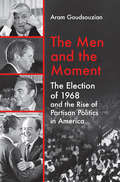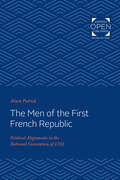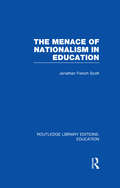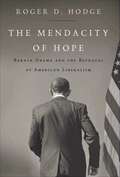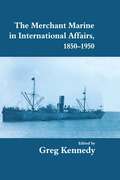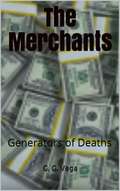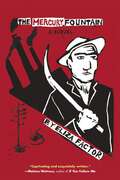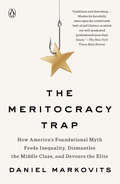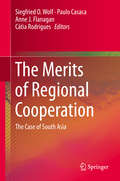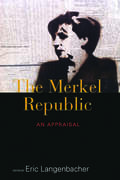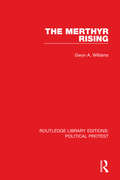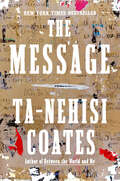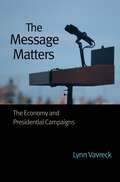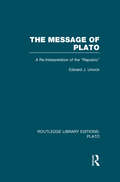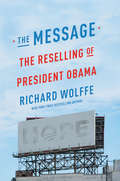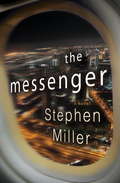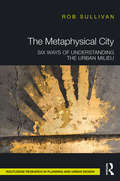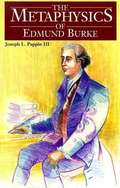- Table View
- List View
The Men Who Would Be King: The Courtships of Queen Elizabeth I
by Josephine Ross“Splendid stuff, ‘history with attitude.’ Written with energy and aplomb.” —The Times (London)The colorful, often tempestuous courtships of Queen Elizabeth I of England (the “virgin Queen”) are brought to breathtaking life in The Men Who Would Be King, a thrilling, utterly fascinating popular history by Josephine Ross. The highly respected author of The Winter Queen and The Tudors, Ross captures all the splendors of the royal court, and all the delicious intrigues surrounding the romances of the powerful daughter of King Henry VIII during her glorious reign. The Men Who Would Be King is spirited British history, captivating and eminently readable, that will equally delight fans of historical nonfiction, Tudor aficionados, and anyone who loves the bestselling novels of Philippa Gregory.
The Men and the Moment: The Election of 1968 and the Rise of Partisan Politics in America
by Aram GoudsouzianThe presidential election of 1968 forever changed American politics. In this character-driven narrative history, Aram Goudsouzian portrays the key transformations that played out over that dramatic year. It was the last "Old Politics" campaign, where political machines and party bosses determined the major nominees, even as the "New Politics" of grassroots participation powered primary elections. It was an election that showed how candidates from both the Left and Right could seize on "hot-button" issues to alter the larger political dynamic. It showcased the power of television to "package" politicians and political ideas, and it played out against an extraordinary dramatic global tableau of chaos and conflict. More than anything else, it was a moment decided by a contest of political personalities, as a group of men battled for the presidency, with momentous implications for the nation's future. Well-paced, accessible, and engagingly written, Goudsouzian's book chronicles anew the characters and events of the 1968 campaign as an essential moment in American history, one with clear resonance in our contemporary political moment.
The Men of the First French Republic: Political Alignments in the National Convention of 1792
by Alison PatrickOriginally published in 1972. The Men of the First French Republic analyzes some of the well-established evidence concerning deputies of the French National Convention of 1792. It was assumed that this evidence supported accepted generalizations about the convention's character and outlook. Patrick's examination of the convention as a whole, rather than its various groups of deputies (Plain, Mountain, and Gironde), suggests that a number of these generalizations may need revising. Patrick looks first at parliamentary behavior, particularly in the tumultuous first eight months, and then analyzes this behavior in terms of the deputies' background.
The Menace of Nationalism in Education (Routledge Library Editions: Education)
by Jonathan Scott FrenchWritten between the two World Wars this volume examines education from the American, British, French & German perspectives and the degree to which the portrayal of those countries in school textbooks contributes to nationalism or world peace.
The Mendacity of Hope: Barack Obama and the Betrayal of American Liberalism
by Roger D. Hodge“The Mendacity of Hope should help wake up all those Obama-voters who've been napping while the wars escalate, the recession deepens, and the environment goes straight to hell.” —Barbara EhrenreichFrom the former editor-in-chief of Harper's Magazine comes a bold manifesto exposing President Obama's failure to enact progressive reform at home and abroad. National Magazine Award finalist Roger Hodge makes a hard-hitting case against Obama's failure to deliver on the promises of his campaign. The first book-length critique of the Obama's presidency from a prominent member of the left, The Mendacity of Hope will strike a chord with anyone stirred by the words of Keith Olbermann, Rachel Maddow, and Frank Rich. It's the book that every frustrated progressive in America has been waiting to read.
The Merchant Marine in International Affairs, 1850-1950 (Cass Series: Naval Policy and History #Vol. 8)
by Greg KennedyMerchant navies represent economic and industrial strength. This study revises the definition of maritime power through a more comprehensive understanding and appreciation for the roles played by the merchant marine of a nation.
The Merchants
by G. G. Vega Laura HernandezThe Merchants is a book that focuses on the serious global problem of the tyranny of the merchants of death. In this last century, like it has never happened before, humanity has suffered the fatal and disastrous consequences, never imagined or expected, of the huge war machine and its victims, in most of the cases, were innocent people. We need to become aware of what we are and why we really exist, as individuals and as a society. Read this book and you will feel that a complete generation has been victim of the industry of war. In this sense, more than ever, we live in a critical period. The planet is full of war material and the worst thing is that many of these war materials are nuclear. Each person has the right to accept or condemn this type of war industry and such a huge destructive power is not convenient for anybody on this planet. We are in a generation where any conflict can lead to a mass destruction thermonuclear war. Worrying about it is not exaggerated. It is criminal not to perceive the seriousness of this situation.
The Merchants' Capital
by Scott P. MarlerAs cotton production shifted toward the southwestern states during the first half of the nineteenth century, New Orleans became increasingly important to the South's plantation economy. Handling the city's wide-ranging commerce was a globally oriented business community that represented a qualitatively unique form of wealth accumulation - merchant capital - that was based on the extraction of profit from exchange processes. However, like the slave-based mode of production with which they were allied, New Orleans merchants faced growing pressures during the antebellum era. Their complacent failure to improve the port's infrastructure or invest in manufacturing left them vulnerable to competition from the fast-developing industrial economy of the North, weaknesses that were fatally exposed during the Civil War and Reconstruction. Changes to regional and national economic structures after the Union victory prevented New Orleans from recovering its commercial dominance, and the former first-rank American city quickly devolved into a notorious site of political corruption and endemic poverty.
The Mercury Fountain: A Novel
by Eliza Factor"Eliza Factor’s first novel, The Mercury Fountain, explores what happens when a life driven by ideology confronts implacable truths of science and human nature. It also shows how leaders can inflict damage by neglecting the real needs of real people. Though the action takes place between 1900 and 1923, the resonance feel alarmingly contemporary. . . Factor counters convention with a sharp sense of character, evocative subplots and the dangerous allure of mercury itself."--New York Times Book Review"Factor develops her characters in entertaining ways while building a novel of social realism."--Kirkus ReviewsSet in a remote stretch of desert near the border of west Texas and Mexico at the turn of the twentieth century, this story follows the pursuits of Owen Scraperton as he struggles to establish Pristina, a utopian community based on mercury mining that aims to resolve the great questions of labor and race. As age, love, and experience cause Owen to modify his original vision, his fiercely idealistic daughter Victoria remains true to Pristina's founding principles-setting them up for a major conflict that captures the imagination of the entire town. The Mercury Fountain combines realistic modern writing with elements from American and Greco-Roman mythology, taking its cue from Mercury, the most slippery and mischievous of gods, who rules over science, commerce, eloquence, and thievery.Eliza Factor was born in 1968 in Boston, Massachusetts, and currently resides in Brooklyn, New York. The Mercury Fountain is her debut novel.
The Mercy Seat
by Elizabeth H. WinthropAs the sun begins to set over Louisiana one October day in 1943, a young black man faces the final hours of his life: at midnight, eighteen-year-old Willie Jones will be executed by electric chair for raping a white girl - a crime some believe he did not commit. In a tale taut with tension, events unfold hour by hour from the perspectives of nine people involved. They include Willie himself, who knows what really happened, and his father, desperately trying to reach the town jail to see his son one last time; the prosecuting lawyer, haunted by being forced to seek the death penalty against his convictions, and his wife, who believes Willie to be innocent; the priest who has become a friend to Willie; and a mother whose only son is fighting in the Pacific, bent on befriending her black neighbours in defiance of her husband. In this exceptionally powerful novel, Elizabeth Winthrop explores matters of justice, racism and the death penalty in a fresh, subtle and profoundly affecting way. Her kaleidoscopic narrative allows us to inhabit the lives of her characters and see them for what they are - complex individuals, making fateful choices we might not condone, but can understand.
The Mercy Seat
by Elizabeth H. WinthropAn unforgettable novel - a riveting, heart-wrenching story of injustice and racism in 1940s Louisiana that is as powerful and profound as it is timely.As the sun begins to set over Louisiana one October day in 1943, a young black man faces the final hours of his life: at midnight, eighteen-year-old Willie Jones will be executed by electric chair for raping a white girl - a crime some believe he did not commit. In a tale taut with tension, events unfold hour by hour from the perspectives of nine people involved. They include Willie himself, who knows what really happened, and his father, desperately trying to reach the town jail to see his son one last time; the prosecuting lawyer, haunted by being forced to seek the death penalty against his convictions, and his wife, who believes Willie to be innocent; the priest who has become a friend to Willie; and a mother whose only son is fighting in the Pacific, bent on befriending her black neighbours in defiance of her husband. In this exceptionally powerful novel, Elizabeth Winthrop explores matters of justice, racism and the death penalty in a fresh, subtle and profoundly affecting way. Her kaleidoscopic narrative allows us to inhabit the lives of her characters and see them for what they are - complex individuals, making fateful choices we might not condone, but can understand.(P)2018 Hodder & Stoughton Limited
The Meritocracy Trap: How America's Foundational Myth Feeds Inequality, Dismantles the Middle Class, and Devours the Elite
by Daniel MarkovitsA revolutionary new argument from eminent Yale Law professor Daniel Markovits attacking the false promise of meritocracy <P><P>It is an axiom of American life that advantage should be earned through ability and effort. Even as the country divides itself at every turn, the meritocratic ideal – that social and economic rewards should follow achievement rather than breeding – reigns supreme. Both Democrats and Republicans insistently repeat meritocratic notions. Meritocracy cuts to the heart of who we are. It sustains the American dream. <P><P> But what if, both up and down the social ladder, meritocracy is a sham? Today, meritocracy has become exactly what it was conceived to resist: a mechanism for the concentration and dynastic transmission of wealth and privilege across generations. Upward mobility has become a fantasy, and the embattled middle classes are now more likely to sink into the working poor than to rise into the professional elite. At the same time, meritocracy now ensnares even those who manage to claw their way to the top, requiring rich adults to work with crushing intensity, exploiting their expensive educations in order to extract a return. All this is not the result of deviations or retreats from meritocracy but rather stems directly from meritocracy’s successes. <P><P>This is the radical argument that Daniel Markovits prosecutes with rare force. Markovits is well placed to expose the sham of meritocracy. Having spent his life at elite universities, he knows from the inside the corrosive system we are trapped within. Markovits also knows that, if we understand that meritocratic inequality produces near-universal harm, we can cure it. When The Meritocracy Trap reveals the inner workings of the meritocratic machine, it also illuminates the first steps outward, towards a new world that might once again afford dignity and prosperity to the American people.
The Merits of Regional Cooperation
by Siegfried O. Wolf Paulo Casaca Anne J. Flanagan Cátia RodriguesThis book highlights various cutting-edge topics and approaches to cooperation and regional integration in South Asia. Contributions from both South Asian and EU scholars carry the distinctive flavour of differing perspectives, in order to identify possible driving factors for regional cooperation. The book is divided into four parts: Peace and Stability focuses on how to combat terrorism and ideologies of hate, looks at governance in the context of cultural diversity, and examines the role of education in achieving traditional and human security; Economic Cooperation deals with potential EU-India trade relations as well as the issue of how to transform the South Asian Association for Regional Cooperation (SAARC) into an effective and coherent economic space; Efficient Use of Resources analyses how the region can achieve more development; EU-South Asia relations elaborates on potential areas of cooperation between the two regions.
The Merkel Republic
by Eric LangenbacherChancellor Angela Merkel has dominated German and European politics for almost a decade. Her stellar reputation, sound political and economic management, and popularity inside of Germany resulted in one of the most decisive electoral victories for her conservative parties in postwar Germany-the country can rightfully be deemed the Merkel Republic. Bringing together German politics experts from both sides of the Atlantic, this volume addresses the campaign, results, and consequences of the 2013 Bundestag election. Chapters delve into a diverse array of themes, including immigrant-origin and women candidates, the fate of the small parties, and the prospects for the SPD, the new coalition partner, as well as more general structural trends like the Europeanization and cosmopolitanization of German politics.
The Mermaid Princesses: A Sister Tale
by Maya Cameron-GordonA magical story starring three Black mermaid sisters who each wish to wear the underwater crown! Perfect for fans of Little Mermaid and Oona.Anaya, Shante, and Kianna are sisters.And these mermaid princesses couldn’t be more different!One day, when a problem too big for any of them to solve alone comes their way, they find out which one of them has what it takes to become legend of the sea.This fun adventure, inspired by African mermaid myth, magic, and spirituality, reminds young readers about the importance of teamwork and the different strengths we can all bring to the table—or throne.
The Merthyr Rising (Routledge Library Editions: Political Protest #13)
by Gwyn A. WilliamsThis book, first published in 1978, examines the independent political action by the thousands of working people in the town of Merthyr Tydfil, Wales. After a mass rally on the hills above the town, thousands of workers under a reg flag broke into insurrection – a detachment of Argyll and Sutherland Highlanders marched into the town to restore order. The rebels repulsed the soldiers and held the town, with at least two dozen workers killed. Within weeks of the Rising, trade unions began to appear in South Wales, and this book argues that these events were central to the emergence of a Welsh working class.
The Message
by Ta-Nehisi Coates#1 NATIONAL BESTSELLER • NEW YORK TIMES BESTSELLER • The renowned author of Between the World and Me journeys to three resonant sites of conflict to explore how the stories we tell—and the ones we don&’t—shape our realities.&“Ta-Nehisi Coates always writes with a purpose. . . . These pilgrimages, for him, help ground his powerful writing about race.&”—Associated Press&“Coates exhorts readers, including students, parents, educators, and journalists, to challenge conventional narratives that can be used to justify ethnic cleansing or camouflage racist policing. Brilliant and timely.&”—Booklist (starred review)FINALIST FOR THE LOS ANGELES TIMES BOOK PRIZE • A BEST BOOK OF THE YEAR: The New York Times Book Review, NPR, Vanity Fair, Town & Country, Electric LitTa-Nehisi Coates originally set out to write a book about writing, in the tradition of Orwell&’s classic &“Politics and the English Language,&” but found himself grappling with deeper questions about how our stories—our reporting and imaginative narratives and mythmaking—expose and distort our realities.In the first of the book&’s three intertwining essays, Coates, on his first trip to Africa, finds himself in two places at once: in Dakar, a modern city in Senegal, and in a mythic kingdom in his mind. Then he takes readers along with him to Columbia, South Carolina, where he reports on his own book&’s banning, but also explores the larger backlash to the nation&’s recent reckoning with history and the deeply rooted American mythology so visible in that city—a capital of the Confederacy with statues of segregationists looming over its public squares. Finally, in the book&’s longest section, Coates travels to Palestine, where he sees with devastating clarity how easily we are misled by nationalist narratives, and the tragedy that lies in the clash between the stories we tell and the reality of life on the ground. Written at a dramatic moment in American and global life, this work from one of the country&’s most important writers is about the urgent need to untangle ourselves from the destructive myths that shape our world—and our own souls—and embrace the liberating power of even the most difficult truths.
The Message Matters: The Economy And Presidential Campaigns
by Lynn VavreckThe economy is so powerful in determining the results of U. S. presidential elections that political scientists can predict winners and losers with amazing accuracy long before the campaigns start. But if it is true that "it's the economy, Stupid," why do incumbents in good economies sometimes lose? The reason, Lynn Vavreck argues, is that what matters is not just the state of the economy but how candidates react to it. By demonstrating more precisely than ever before how candidates and their campaigns affect the economic vote, The Message Matters provides a powerful new way of understanding past elections--and predicting future ones. Vavreck examines the past sixty years of presidential elections and offers a new theory of campaigns that explains why electoral victory requires more than simply being the candidate favored by prevailing economic conditions. Using data from presidential elections since 1952, she reveals why, when, and how campaign messages make a difference--and when they can outweigh economic predictors of election outcomes. The Message Matters does more than show why candidates favored by the economy must build their campaigns around economic messages. Vavreck's theory also explains why candidates disadvantaged by the economy must try to focus their elections on noneconomic issues that meet exacting criteria--and why this is so hard to do.
The Message Matters: The Economy and Presidential Campaigns
by Lynn VavreckThe economy is so powerful in determining the results of U.S. presidential elections that political scientists can predict winners and losers with amazing accuracy long before the campaigns start. But if it is true that "it's the economy, Stupid," why do incumbents in good economies sometimes lose? The reason, Lynn Vavreck argues, is that what matters is not just the state of the economy but how candidates react to it. By demonstrating more precisely than ever before how candidates and their campaigns affect the economic vote, The Message Matters provides a powerful new way of understanding past elections--and predicting future ones. Vavreck examines the past sixty years of presidential elections and offers a new theory of campaigns that explains why electoral victory requires more than simply being the candidate favored by prevailing economic conditions. Using data from presidential elections since 1952, she reveals why, when, and how campaign messages make a difference--and when they can outweigh economic predictors of election outcomes. The Message Matters does more than show why candidates favored by the economy must build their campaigns around economic messages. Vavreck's theory also explains why candidates disadvantaged by the economy must try to focus their elections on noneconomic issues that meet exacting criteria--and why this is so hard to do.
The Message of Plato: A Re-Interpretation of the Republic (Routledge Library Editions: Plato)
by Edward J UrwickEdward Urwick’s original work draws upon Plato’s best known work, the Republic, to provide a new interpretation of Plato’s teaching based upon Indian religious thought. Most scholars have sought to interpret the Republic from the standpoint of politics, ethics, and metaphysics and indeed the accepted title of the dialogue – Concerning a Polity or Republic – would seem to legitimate this. Even the alternative title for the work – Concerning Justice – seems to justify such an approach. Yet the original Greek work, Dikaiosune, had a fuller meaning: righteousness. The author believes this gives a truer clue to the meaning of the dialogue. It is a discussion of righteousness in all its forms, from the just dealing of the law-abiding citizen to the spirit of holiness in the saint.
The Message: The Reselling of President Obama
by Richard WolffeThey had 99 problems but Mitt Romney wasn't one.At the start of an epic election, the team trying to reelect President Obama faced a mountain of challenges: a dismal economy, the faded hopes of the first campaign, and a struggle to raise enough cash to compete. No president had risen so fast, or fallen so far, in the modern era. And no president in living memory had earned a second term in such troubled times. To resell the president, they needed to redefine the world they were living in. They needed to retell their own story and rewrite the characters.They needed to find The Message.But first, they needed to fight the enemy within: each other. For six years they kept a lid on their internal disputes-the ego clashes, the disappointed ambitions, and the battle to control the Obama brand. Everything was out of public view and under wraps. They called their style No Drama Obama, and the phrase matched the mood of the candidate. But it was never completely true.In 2008 they found a way around their rivalries. Four years later, their hostilities threatened to undermine the reelection of a president at a time when most voters were deeply unhappy and ready for change.Drawing on unrivaled access to the key characters, THE MESSAGE tells the inside story of the Mad Men-the marketers, message-shapers, and admakers-who held the Obama presidency in their hands.
The Messenger
by Stephen MillerIn a world of heightened threat levels, sleeper cells, and unseen enemies, one novel explores the war on terrorism with harrowing suspense . . . and deep humanity. Daria emerges from a refugee camp a believer. She has lost everything, witnessed the unthinkable, and committed herself to a mission with a deadly conclusion. Indoctrinated, trained, and given a ticket to New York, she blends in, posing as an ambitious journalist--an "arrow" hoping to hit too many targets to count. Dr. Sam Watterman is recruited too. Falsely accused and disgraced in the anthrax inquiries after 9/11, he is no longer a believer in causes. But the government that ruined his career now demands his expertise to locate a threat putting millions of Americans in peril. In a country that fights wars on foreign soil but remains terrified of the cataclysm at home, Sam strives toward redemption and Daria desperately seeks both rebellion and enlightenment. Their lives will intersect at a place that will test their faith and make them each question what it means to have something worth dying for. With a riveting plot that spans sixteen fraught, compelling days, Stephen Miller's dazzling novel of literary suspense brings the war to a landscape both familiar and vulnerable: the America we call home.From the Hardcover edition.
The Metaphysical City: Six Ways of Understanding the Urban Milieu
by Rob SullivanThe Metaphysical City examines the metaphorical existence of the city as an entity to further understand its significance on urban planning and geography. It encourages an open-minded approach when studying cities so as to uncover broader connecting themes that may otherwise be missed. Case studies of New York, Paris, Cairo, Mumbai, Tokyo, and Los Angeles explore a metaphor specific to each city. This multidisciplinary analysis uses philosophical treatises, geographical analysis, and comparative literature to uncover how each city corresponds to the metaphor. As such, it allows the reader to understand the city from six differing points of view. This book would be beneficial to students and academics of urban planning, geography, and comparative literature, in particular those with an interest in a metaphysical examination of cities.
The Metaphysics of Edmund Burke
by Joseph L. PappinThe most recent commentators on Edmund Burke have renewed the charge that his political thought lacks the consistency and coherency necessary to even claim the status of a political philosophy and that he is indeed a "utilitarian." They mark him off as an "ideologist," a "rhetorician," and a "deliberate propagandist." Directly opposed to this renewed "utilitarian" interpretation of Burke is Joseph Pappin’s work The Metaphysics of Edmund Burke. Not only does this work challenge the "utilitarian" view of Burke, it sets out, as not other work on Burke has attempted to do, "to make explicit the implicit metaphysical core of Burke’s political thought." Pappin does this by examining both Burke’s critics and Burke’s own attack on a rationalist, ideologically inspired metaphysics.
The Method of Freedom
by Paul Sharkey Errico Malatesta Davide TurcatoFor sixty years, Errico Malatesta's involvement with international anarchism helped fuel the movement's radical approach to class and labor, and directly impacted the workers' movement in Italy. A talented newspaper journalist, Malatesta's biting critiques were frequently short and to the point-and written directly to and for the workers. Though his few long-form essays, including "Anarchy" and "Our Program," have been widely available in English translation since the 1950s, the bulk of Malatesta's most revolutionary writing remains unknown to English-speaking audiences.In The Method of Freedom, editor Davide Turcato presents an expansive collection of Malatesta's work, including new translations of existing works and a wealth of shorter essays translated here for the first time. Offering readers a thorough overview of the evolution of Malatesta's revolutionary thought during his half a century as an anarchist propagandist, The Method of Freedom explores revolutionary violence and workplace democracy, the general strike and the limitations of trade unionism, propaganda by the deed, and the revolution in practice.Errico Malatesta (1853-1932) was an enormously popular Italian anarchist, perhaps most well-known for his strong support of direct action and the general strike. A talented newspaper journalist and editor, Malatesta spent much of his life exiled from Italy because of his political beliefs.Davide Turcato is a computational linguist and an independent historian. He is the author of Making Sense of Anarchism and the editor of Malatesta's collected works, a ten-volume project currently underway in Italy, to be released in English by AK Press.

